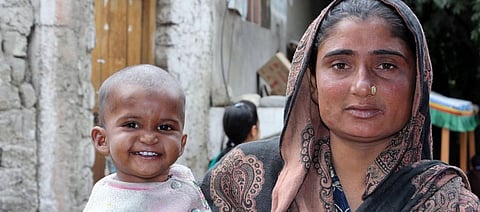Can we compromise on procreation in the wake of climate change
Reproduction is one of the primal instincts that distinguishes the living from the non-living. The absolute rule of life is to survive, sustain and evolve by passing on your genetic legacy through offspring.
Since the beginning of life on Earth, countless organisms have constantly worked towards defining their place and significance in this fight for survival. Many evolved and many lost.
The ones who adapted to their changing habitats flourished while others became extinct. Thus, this process of evolution is dependent on the fundamental of ‘survival of the fittest’.
The earliest humans (Homo habilis) evolved around 2.8 million years ago. Since then, we have greatly adapted, evolved and are continuously working towards mastering the art of living. One of the most pertinent issues of this Anthropocene Epoch is accelerating global warming and associated climate change.
Alternatives to tackle this issue are being constantly researched. But what if we decide to give up on the situation and settle it down with a compromise? A compromise so outlandish that it bypasses our primary need — ‘The compromise of reproduction’?
Women are carriers of genetic makeup. They gestate, brood life together with men, thus keeping the cycle of life running.
A number of well-educated women, especially the ones in climate conscious circles, are joining the group and movement called ‘Birthstrike’ due to climate change. A month-old study titled Fertility decisions of the Anthropocene, conducted by Ryan Ricciardia of George Washington University indicated that 51.1 per cent of the respondents did not wish to have any children.
People are purposefully looking forward to being childless. Recently, Alexandria Ocasio- Cortez (US Congresswoman) raised a question on her Instagram Live – ‘Is it still okay to have children?’- in the wake of the climate catastrophe.
Many individuals have started questioning the future sustenance of their children. According to the World Health Organization, the burden of climate change is greater on future generations than on adults, especially in under-developed and developing countries.
A child born today will live in a world where natural disasters become more violent and frequent. Climate ethicists are in a moral dilemma, comparing procreation to pollution, overconsumption and increased carbon impact on our planet.
If we dive deeper into this hullaballoo, some specific points flash out. Firstly, numerous upcoming evidences are suggesting the influence of climate change on children’s health before conception, during pregnancy, childhood and adolescence.
This indicates the greater public health challenges that will be faced in the future. Rising temperatures and associated complications are expected to generate higher stress levels on maternal and child health.
Research suggests heat-induced disorders in mothers can lead to complications like pre-mature labour, intra-uterine growth retardation, neonatal and infant mortality.
Environmental factors like increased humidity are associated with eclampsia.
Second, there are concerns regarding increased resource consumption. The greater the population, the more will be each person’s individual contribution to carbon dioxide emissions, ultimately leading to anthropogenic global warming.
Average land area available per person will become smaller. Waste generation problems will jack up. Children also tend to consume more air, water and food in their early developmental stages. They thus will have higher exposure to various pollutants and degraded environments from the early part of their lives.
Third, there are moral and ethical obligations of people concerned with future anticipations of a healthier and better lifestyle for their kids.
People feel guilty about their personal lifestyle contributing to environmental destruction. They are transforming towards eating less meat, switching to electric vehicles, avoiding single use plastic, etc.
A well-documented example suggests that rising levels of greenhouse gases lead to water cycle intensification that can be a concern for children prone to illnesses associated with famines and floods.
These environmental revelations are also leading to heightened ecosystem distress syndrome among people. Evidence suggests that for displaced indigenous people, past nostalgia where socio-environmental integration was valued, is a painful experience.
Even those individuals who are not being physically displaced, are distressed due to powerlessness and the environmental injustice inflicted upon them.
With increasing awareness, people are feeling divorced from their homelands. The modern world is transforming at such a rapid pace in terms of social and natural environment that adaptations are difficult for everyone, if not impossible.
This makes us the sufferers of ‘Solastalgia’ – described as the pain caused by loss of relief and a sense of isolation connected to the present state of our home, the Earth.
This emotion can also be future-oriented and can make sufferers shift to activities that provide them with solace in their current surroundings — like compromising procreation to reduce carbon impact.
A fine balance
There are disagreements regarding the severity of this global issue. But due to increased homogenisation and communication within people, the topics of overpopulation and ethics of procreation are being widely challenged.
The major question here is — Is putting a stop to human genetic flow the only possible way to thrive?
It is generally assumed that attaining knowledge leads to changes in attitudes and changed attitudes shape one’s behaviour.
But in the context of climate change, too much harsh knowledge about environmental tragedies is creating a sense of hopelessness and helplessness in some individuals, instead of motivating them to act in more responsible ways.
Equal priority needs to be given to both, ‘environment knowledge’ as well as ‘environmental behaviours’. Actions speak louder than words.
Research suggests that there are strong links behind childhood nature experiences and adult behaviour. Environmental behaviours are less the result of learning and knowledge and more the result of real-life experiences.
Merely educating the public with environmental realities will not help but demonstrating and inculcating environmental behaviours will make a difference.
Thus, a balance needs to be established so that facing realities does not result in counterproductive actions.
Views expressed are the author’s own and don’t necessarily reflect those of Down To Earth


